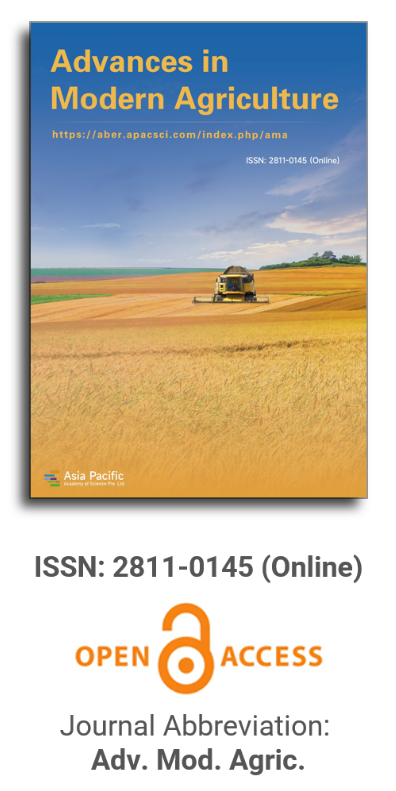


2025
Vol 6, No 2 (2025)
Nutrient management improves land and soil properties by enhancing the nutrient content and structure, promoting sustainable agricultural productivity and crop health. This issue showcases several works including the land use impacts on soil properties in rainforests, resource use and profitability of a cowpea-based farming system, use of organomineral products in agriculture and the effects of pesticide residues on soil microbes population. Understanding these physical and chemical properties of soils helps us to develop better systems to improve agricultural productivity and crop resilience. The issue also features a review on the impact of climate change on agriculture and economic growth, where changes in greenhouse gas concentration, temperature, rainfall patterns, cloud cover and others are detrimental to agricultural production and subsequently towards economic growth.
Vol 6, No 1 (2025)
Water overexploitation in agriculture can be caused by inefficient irrigation practices and infrastructure, leading to reduced crop yields and land degradation. The proper use of land and water resource are essential to achieve long-term agricultural sustainability. This issue highlights works on sustainable agricultural water productivity, eco-farming policies and agricultural inputs on farming for certain regions. There is also a review on the strategies to optimize resource utilization for urban agricultural systems. These works provide a better outlook on the individual and collaborative interactions within an urban city to address water and resource utilization, to support a more resilient agricultural ecosystem.
2024
Vol 5, No 4 (2024)
In the symphony of technology and nature, this collection of studies unfolds like a multidimensional canvas of agricultural revolution. From the three-dimensional reconstruction technology weaving holographic blueprints of crop growth in digital precision, to the gradual replacement of roaring diesel engines with the silent, zero-emission hum of electric tractors; from the genetic "whispers" in cornfields (the yield miracle of the L10×T2 hybrid) unlocking productivity barriers, to smallholder farmers in Afghanistan’s rugged terrain battling climate extremes with ancient wisdom; and along the Nile, rice growers navigating water scarcity and policy puzzles to decode the mathematical enigma of supply elasticity—these studies collectively sketch a global agricultural transformation spanning technology, ecology, and humanity. The highlights lie in how AI and sensors equip farming with "intelligent eyes," clean-energy machinery reshapes the rhythm of fields, genetic compatibility reveals golden rules of life’s propagation, and social-ecological perspectives translate the struggles of vulnerable regions into resilient strategies. Each paper is both a laboratory-crafted equation and a story rooted in soil, offering scholars a key: how to balance the race of innovation with nature’s limits, crafting a sustainable future for global food security.
Vol 5, No 3 (2024)
Welcome to Volume 5, Issue 3 of Advances in Modern Agriculture. This issue offers the most recent research findings in modern agriculture from novel research viewpoints, revealing the current concerns in modern agriculture. This issue includes an analysis of agricultural sector indicators, the performance of modern farming machines, the environmental conditions for high crop yields, and biomaterials' application in agriculture. These papers underline the close connection between agriculture and sustainability, investigate the best approaches to improve agricultural production, and provide impetus for the advancement of modern agricultural research.
Vol 5, No 2 (2024)
Vol 5, No 1 (2024)
2023
Vol 4, No 2 (2023)
Vol 4, No 1 (2023)
2022
Vol 3, No 2 (2022)
Vol 3, No 1 (2022)
2021
Vol 2, No 2 (2021)
Vol 2, No 1 (2021)
2020
Vol 1, No 1 (2020)

Prof. Zhengjun Qiu
Zhejiang University, China

Cheng Sun
Academician of World Academy of Productivity Science; Executive Chairman, World Confederation of Productivity Science China Chapter, China
Indexing & Archiving
In the realm of modern agriculture, the integration of cutting-edge technologies is revolutionizing the way we approach sustainable farming practices. A recent study published in Advances in Modern Agriculture titled "Classification of cotton water stress using convolutional neural networks and UAV-based RGB imagery" has garnered significant attention for its innovative approach to precision irrigation management. Conducted by researchers from Institute of Data Science and the AgriLife Research and Extension Center of Texas A&M University (authors's information is below). This study introduces a novel method for classifying cotton water stress using unmanned aerial vehicles (UAVs) and convolutional neural networks (CNNs), offering a powerful solution for optimizing water use in agriculture.
Modern agricultural technology is evolving rapidly, with scientists collaborating with leading agricultural enterprises to develop intelligent management practices. These practices utilize advanced systems that provide tailored fertilization and treatment options for large-scale land management.
This journal values human initiative and intelligence, and the employment of AI technologies to write papers that replace the human mind is expressly prohibited. When there is a suspicious submission that uses AI tools to quickly piece together and generate research results, the editorial board of the journal will reject the article, and all journals under the publisher's umbrella will prohibit all authors from submitting their articles.
Readers and authors are asked to exercise caution and strictly adhere to the journal's policy regarding the usage of Artificial Intelligence Generated Content (AIGC) tools.
Asia Pacific Academy of Science Pte. Ltd. (APACSCI) specializes in international journal publishing. APACSCI adopts the open access publishing model and provides an important communication bridge for academic groups whose interest fields include engineering, technology, medicine, computer, mathematics, agriculture and forestry, and environment.



.jpg)
.jpg)

.jpg)
